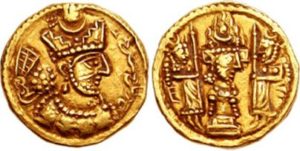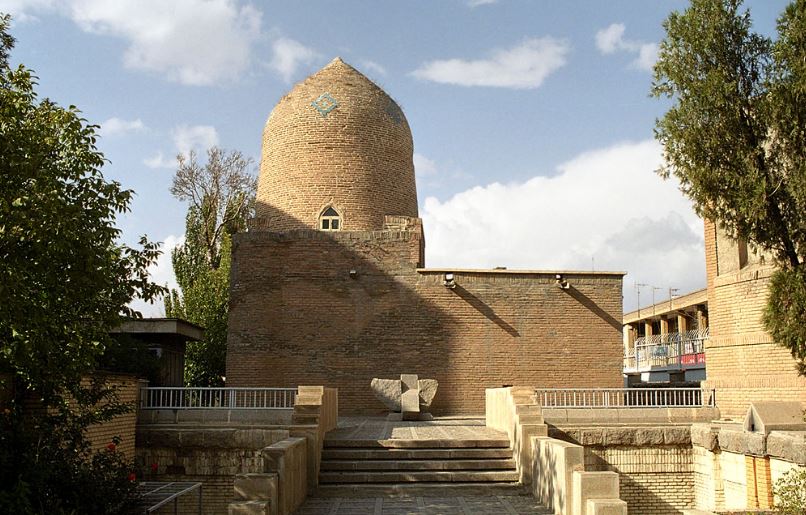
Gold Coins Depicting Iranian Shah Bahram V, often referred to as Bahramgur – “Bahram the Hunter”
Shushandukht (c. 380-430 CE) was born in Persia, the daughter of the Resh Galuta (Exilarch), a title reserved for the chief rabbi and official leader of the Jews in the diaspora during this time period. Little is known of her early life. She went on to marry the Sasanian king Yazdegerd I, and gave him two sons, Shapur IV and Bahram V (c. 406-438 CE). Yazdegerd and Shapur were assassinated, triggering a brief civil war that ended with Bahram successfully taking the throne. Bahram V went on to reign for nearly two decades as Iran’s Shah. In that time, he held off the advancing Eastern Roman Empire and conquered Armenia. Later, a massive invasion by the feared Huns nearly destroyed his empire. However, he caught the Huns unaware in a surprise night attack, decimating their force, and bringing peace to the entire region. Bahram presided over a period of great Persian wealth. Coins with Bahram’s portrait have been found across Asia. Not surprisingly, Bahram V became one of the most legendary kings in Asian history, and is an important figure not just in Iran, but in Uzbekistan, Pakistan, India, and even in Islamic literature (despite the fact that the Muslims tried pretty hard to erase pre-Islamic Iranian history). Bahram V is the hero of many ancient Persian legends. One of these was translated into English under the title The Three Princes of Serendip – giving rise to the word “serendipity”. In the famous Persian epic Shahnameh, he is the king that slays two lions with his bare hands. Meanwhile, his mother Shushandukht used her position to assist the Jews of Iran (where the vast majority of the world’s Jews lived at the time). She established large and prosperous Jewish neighbourhoods in Esfahan, Susa, Hamadan, and Shushtar. During this period, the Jewish Exilarch sat on the Shah’s court. Many scholars believe that the ‘Tomb of Esther and Mordechai’ in modern-day Iran is actually the tomb of Shushandukht.
Words of the Week
It is more important to know what sort of person has a disease than to know what sort of disease a person has.
– Hippocrates

Tomb of Esther and Mordechai (or Shushandukht) in present-day Hamadan, Iran (Credit: Philippe Chavin)


 Shlom-Tzion (139–67 BCE), more commonly known by her Hellenized name Salome Alexandra, has the distinction of being the only true, independent Jewish Queen of Israel in history. Her husband was the king Alexander Yannai, a Sadducee who sparked a civil war and began an extermination campaign against traditional Judaism. At his death, Salome took over and restored peace to the kingdom. She ended her husband’s cruel persecutions of the rabbis (recalling many of them from exile in Egypt, including her brother, the great Shimon ben Shetach). She also re-established the Sanhedrin, the Jewish Supreme Court. Together with the sages of the day, a public school system was instituted for all children, rich or poor. Salome also championed the rights of women and developed the marriage document (ketuba) with clauses that protect the bride, as we still use to this day. Greatly expanding the army and fortifying Judea’s borders, Salome protected the kingdom from foreign powers (particularly Armenia and Syria). Her reign was marked by incredible prosperity, and the Talmud recounts that during her nine-year rule the rains always came in their times, oats grew as large as olives and wheat grains as large as kidney beans. Sadly, the kingdom quickly unraveled at her death, and was shortly after conquered by Rome.
Shlom-Tzion (139–67 BCE), more commonly known by her Hellenized name Salome Alexandra, has the distinction of being the only true, independent Jewish Queen of Israel in history. Her husband was the king Alexander Yannai, a Sadducee who sparked a civil war and began an extermination campaign against traditional Judaism. At his death, Salome took over and restored peace to the kingdom. She ended her husband’s cruel persecutions of the rabbis (recalling many of them from exile in Egypt, including her brother, the great Shimon ben Shetach). She also re-established the Sanhedrin, the Jewish Supreme Court. Together with the sages of the day, a public school system was instituted for all children, rich or poor. Salome also championed the rights of women and developed the marriage document (ketuba) with clauses that protect the bride, as we still use to this day. Greatly expanding the army and fortifying Judea’s borders, Salome protected the kingdom from foreign powers (particularly Armenia and Syria). Her reign was marked by incredible prosperity, and the Talmud recounts that during her nine-year rule the rains always came in their times, oats grew as large as olives and wheat grains as large as kidney beans. Sadly, the kingdom quickly unraveled at her death, and was shortly after conquered by Rome.